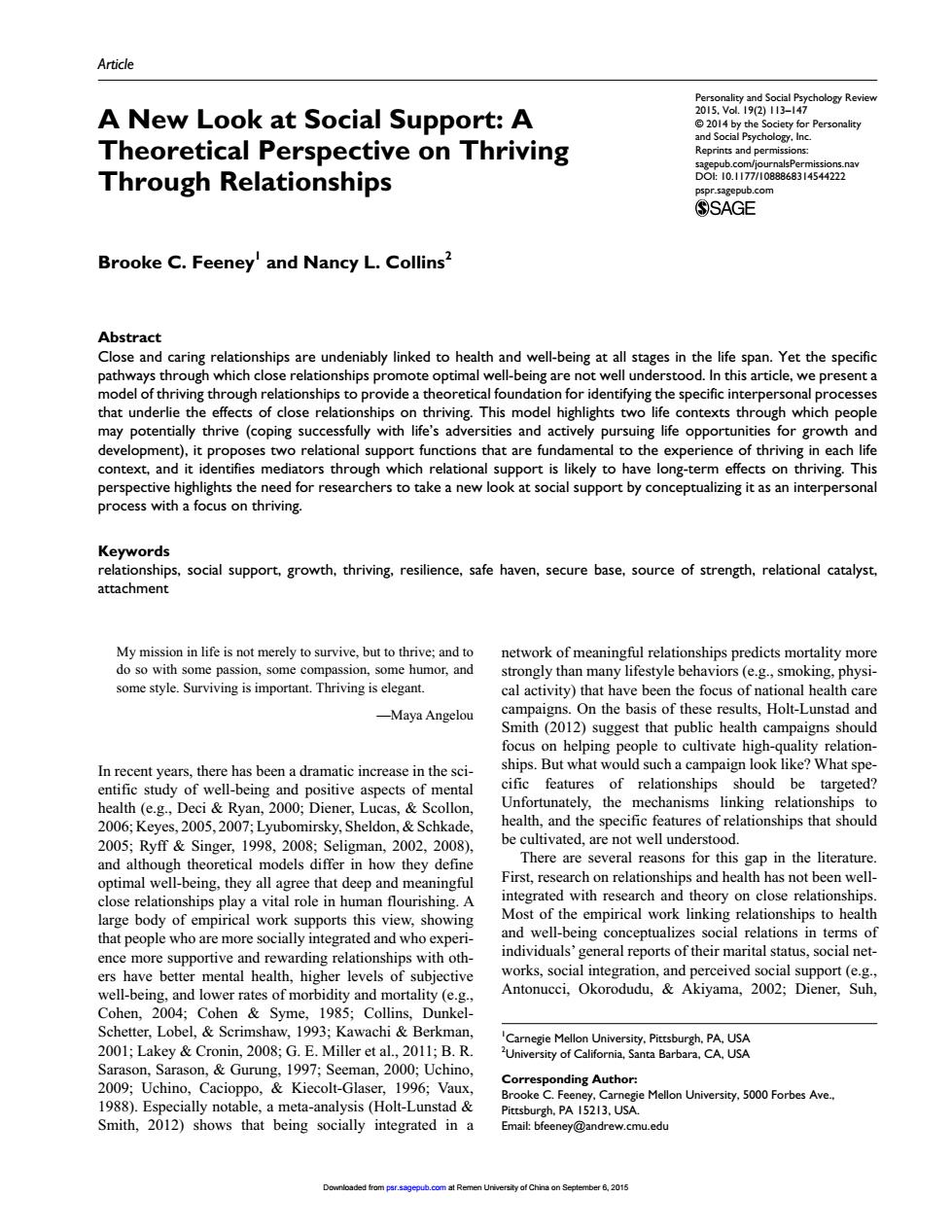正在加载图片...

Article A New Look at Social Support:A 2014可 Theoretical Perspective on Thriving Through Relationships SAGE Brooke C.Feeney'and Nancy L.Collins2 Abstract Close and caring relationships are undeniably linked to health and well-being at all stages in the life span.Yet the specific pathways thro which clos I-b this article,we present that nde on thri This model hie may potentially thrive (coping successfully with life's adversities and actively pursuing life opportunities for growth and development).it proposes two relational support functions that are fundamental to the kehtenpPorskeyol e experience of thriving in each life t,and it es me tors thro ve long-term ef cts on ers to e a new support by concept ing it as an interpers Keywords social support growth,thriving.resilience,safe haven,secure e base,source of strength,relational catalyst attachment My mission in life is not merely to survive,but to thrive:and to network of meaningful relationships predicts mortality more do so with some passion,some compassion,some humor,and strongly than many lifestyle behaviors(e.g.,smoking,physi some style. Surviving is important.I hriving is elegant. -Mava Angelou focus on helping people to cultivate high-quality relation ships.But what would such a campaign look like?What spe ships health (e.g Deci&Ryan.2000:Diener.Lucas.Scollon the should be targeted that should 2006;Keyes,2005,2007;Lyubomirsky,Sheldon,Schkade be cultivated are not well understood 2005,Ry&Singer,1998,200i Selign 1,20 008 There are several reasons for this gap in the literature. mal well-being they all that de and r on relationships and health has not been v arge body of empirical work supports this view,showing Most of the rical work linkin at peopl and well-being conceptualizes social relations in terms of individuals'general reports of their marital status,social net well-being,and lower rates of morbidity and mortality (e.g. 2002.DS Syme Dunk 2001-L 2008:G.E.Mille Car egie Mellon Univ Sar on.Sarason.Gurung.1997:Seeman.2000:Uching 2009;Uchino,Cacioppo,&Kiecolt-Glase Co ding Author: 1996;Vaux 5000 Forbes Ave. Smith 2012)shows that a me an ing Personality and Social Psychology Review 2015, Vol. 19(2) 113–147 © 2014 by the Society for Personality and Social Psychology, Inc. Reprints and permissions: sagepub.com/journalsPermissions.nav DOI: 10.1177/1088868314544222 pspr.sagepub.com Article My mission in life is not merely to survive, but to thrive; and to do so with some passion, some compassion, some humor, and some style. Surviving is important. Thriving is elegant. —Maya Angelou In recent years, there has been a dramatic increase in the scientific study of well-being and positive aspects of mental health (e.g., Deci & Ryan, 2000; Diener, Lucas, & Scollon, 2006; Keyes, 2005, 2007; Lyubomirsky, Sheldon, & Schkade, 2005; Ryff & Singer, 1998, 2008; Seligman, 2002, 2008), and although theoretical models differ in how they define optimal well-being, they all agree that deep and meaningful close relationships play a vital role in human flourishing. A large body of empirical work supports this view, showing that people who are more socially integrated and who experience more supportive and rewarding relationships with others have better mental health, higher levels of subjective well-being, and lower rates of morbidity and mortality (e.g., Cohen, 2004; Cohen & Syme, 1985; Collins, DunkelSchetter, Lobel, & Scrimshaw, 1993; Kawachi & Berkman, 2001; Lakey & Cronin, 2008; G. E. Miller et al., 2011; B. R. Sarason, Sarason, & Gurung, 1997; Seeman, 2000; Uchino, 2009; Uchino, Cacioppo, & Kiecolt-Glaser, 1996; Vaux, 1988). Especially notable, a meta-analysis (Holt-Lunstad & Smith, 2012) shows that being socially integrated in a network of meaningful relationships predicts mortality more strongly than many lifestyle behaviors (e.g., smoking, physical activity) that have been the focus of national health care campaigns. On the basis of these results, Holt-Lunstad and Smith (2012) suggest that public health campaigns should focus on helping people to cultivate high-quality relationships. But what would such a campaign look like? What specific features of relationships should be targeted? Unfortunately, the mechanisms linking relationships to health, and the specific features of relationships that should be cultivated, are not well understood. There are several reasons for this gap in the literature. First, research on relationships and health has not been wellintegrated with research and theory on close relationships. Most of the empirical work linking relationships to health and well-being conceptualizes social relations in terms of individuals’ general reports of their marital status, social networks, social integration, and perceived social support (e.g., Antonucci, Okorodudu, & Akiyama, 2002; Diener, Suh, 544222 PSRXXX10.1177/1088868314544222Personality and Social Psychology ReviewFeeney and Collins research-article2014 1 Carnegie Mellon University, Pittsburgh, PA, USA 2 University of California, Santa Barbara, CA, USA Corresponding Author: Brooke C. Feeney, Carnegie Mellon University, 5000 Forbes Ave., Pittsburgh, PA 15213, USA. Email: bfeeney@andrew.cmu.edu A New Look at Social Support: A Theoretical Perspective on Thriving Through Relationships Brooke C. Feeney1 and Nancy L. Collins2 Abstract Close and caring relationships are undeniably linked to health and well-being at all stages in the life span. Yet the specific pathways through which close relationships promote optimal well-being are not well understood. In this article, we present a model of thriving through relationships to provide a theoretical foundation for identifying the specific interpersonal processes that underlie the effects of close relationships on thriving. This model highlights two life contexts through which people may potentially thrive (coping successfully with life’s adversities and actively pursuing life opportunities for growth and development), it proposes two relational support functions that are fundamental to the experience of thriving in each life context, and it identifies mediators through which relational support is likely to have long-term effects on thriving. This perspective highlights the need for researchers to take a new look at social support by conceptualizing it as an interpersonal process with a focus on thriving. Keywords relationships, social support, growth, thriving, resilience, safe haven, secure base, source of strength, relational catalyst, attachment Downloaded from psr.sagepub.com at Remen University of China on September 6, 2015